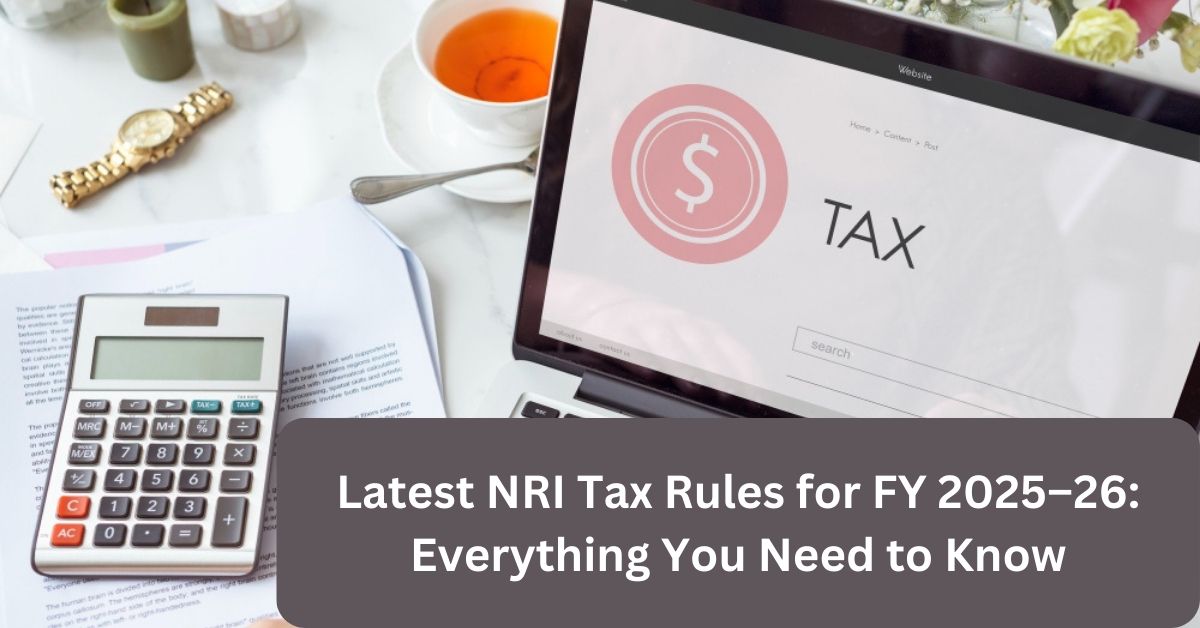As a Non-Resident Indian (NRI), one of the most critical aspects of managing your finances is keeping an eye on tax rules. Every financial year brings new updates, and FY 2025–26 is no exception. If you earn rental income, receive dividends, or invest in Indian markets, it is important to stay updated on the latest NRI tax regulations.
Being informed about these rules can help you avoid unnecessary penalties and plan your finances better. This guide explains the new rules, how they affect you, and why consulting NRI tax experts can make your tax journey much smoother.
Understanding NRI Residential Status
Your tax liability in India depends primarily on your residential status. Broadly, you qualify as an NRI if you spend less than 182 days in a year in India during the financial year. However, additional rules around days of stay, past years’ visits, and income levels can alter your classification.
There is also the RNOR (Resident but Not Ordinarily Resident) status, which applies when you return to India or your stay is irregular. This status influences which part of your global income is taxable in India. Assessing your residency correctly each year is the foundation of proper tax planning.
NRI Income Tax Slabs for FY 2025–26
For FY 2025–26, NRIs are taxed under the same slab system as resident Indians. You can choose between the existing regime and the new regime.
Previous regime:
- Income up to ₹2,50,000: Nil
- ₹2,50,001 to ₹5,00,000: 5%
- ₹5,00,001 to ₹10,00,000: ₹12,500 + 20% of income above ₹5,00,000
- Above ₹10,00,000: ₹1,12,500 + 30% of income above ₹10,00,000
New regime:
- Income up to ₹4,00,000: Nil
- ₹4,00,001 to ₹8,00,000: 5%
- ₹8,00,001 to ₹12,00,000: 10%
- ₹12,00,001 to ₹16,00,000: 15%
- ₹16,00,001 to ₹20,00,000: 20%
- ₹20,00,001 to ₹24,00,000: 25%
- Above ₹24,00,000: 30%
Surcharge and 4% health and education cess apply to both regimes. Certain types of income, such as long-term capital gains on equity investments, have special tax rates.
Key Updates for FY 2025–26
1. Choice of regime: You can opt for either the old regime with deductions and exemptions or the new simplified regime. Depending on your income mix, one may give you significant savings.
2. Filing requirements: Even if your income is modest, you may be required to file returns if your TDS or TCS exceeds ₹25,000 or if you cross specified deposit or expenditure thresholds.
3. Double Taxation Avoidance Agreements (DTAA): If you live in a country that has a tax treaty with India, you can claim foreign tax credits or exemptions. This helps you avoid paying tax twice on the same income.
4. Bank account rules: Interest on NRO accounts is taxable, and banks may apply account maintenance and transaction charges. NRE and FCNR account interest is generally exempt, but other account charges may still apply.
5. Capital gains: Long-term capital gains on equities above one lakh rupees attract a 10% tax. Short-term gains and debt mutual funds have different rules, so it is important to review your portfolio carefully.
6. Change in status: If you move back or extend your stay in India, your status may shift from NRI to RNOR or eventually to Resident. This significantly changes your taxable income base.
Practical Steps for NRI Tax Filing India
To manage your taxes effectively, start by determining your residency status. Next, collect information about all Indian income sources, including rental, dividends, capital gains, and interest. Compare your tax liability under both regimes to see which one suits you better.
Make sure to use DTAA provisions if applicable to reduce your overall tax outgo. Filing your return on time is strongly recommended, even when optional, as it allows you to claim refunds and avoid compliance issues. Finally, always factor in NRI account charges when planning your financial moves, since these affect your actual returns.
Why Work with NRI Tax Experts and Advisors
Tax laws are complex, and even small oversights can lead to higher liabilities. Engaging with NRI tax experts ensures you stay compliant and also benefit from strategic planning. An experienced NRI investment advisor in India can help you structure your portfolio to minimize taxes while maximizing returns.
If you’re looking for a firm in Pune, working with professionals who specialize in NRI tax planning in Pune can give you an added advantage. You can gain a comprehensive understanding of local insights, especially regarding property income or state-specific compliance.
The Role of Sachin Gujar & Associates in NRI Tax Planning
Sachin Gujar & Associates has built a strong reputation for guiding NRIs through the complexities of Indian taxation and investment planning. With decades of expertise, the firm combines in-depth knowledge of tax laws, compliance requirements, and financial advisory to deliver tailor-made solutions.
Whether it is handling intricate tax filings, structuring investments for better post-tax returns, or navigating DTAA provisions, Sachin Gujar & Associates provides end-to-end support. Their specialized services in NRI tax planning in Pune make them a trusted partner for individuals looking to optimize their wealth while ensuring compliance with evolving regulations.
The financial year 2025–26 gives you more flexibility through two tax regimes, but it also adds complexity with thresholds, filing triggers, and account rules. By understanding your residency, evaluating your income sources, and planning your filings early, you can avoid mistakes and make smart financial choices.
Partnering with NRI tax experts or an NRI investment advisor in India ensures you not only stay compliant but also make the most of tax-saving opportunities. For those looking for experienced guidance, S Gujar offers the right blend of professional knowledge, practical solutions, and local expertise in NRI tax planning in Pune. Staying ahead today means less stress and stronger financial health tomorrow. Contact us today to get expert assistance in planning your NRI taxes with confidence.



